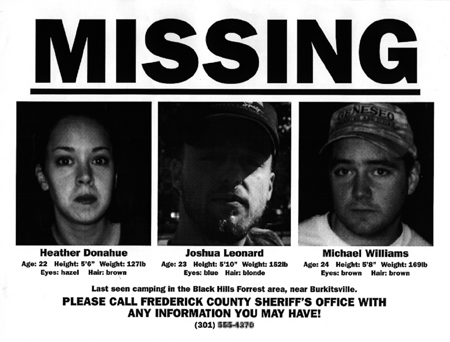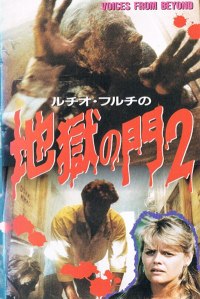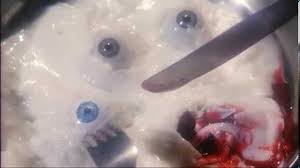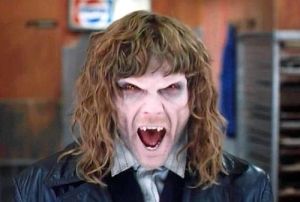
There were three occasions in the 1990s where friends came to me and said, “oh my God, get in the car right now, we have to go see this movie.” Every time this happened I did not know anything about the movie beforehand, and all three times I was blown away by the movies. On top of that, all three of these movies changed the course of film history. I’m talking, of course, about Pulp Fiction, Scream, and The Blair Witch Project.
Whatever your feelings were on The Blair Witch Project in 1999, and however you feel about how it has held up, you can’t deny its impact on popular culture. First of all, the theatrical release was paired with a TV mockumentary which convinced many people that Heather Donahue, Joshua Leonard, and Michael C. Williams actually did go missing in the woods; if I recall correctly, those three had to go on a talk show and proclaim that they were in fact still alive. Thankfully, the hysteria stopped short of actual court proceedings, unlike the case of Cannibal Holocaust.
But the biggest legacy that Blair Witch has left us with is the explosion of mockumentary horror films. Although the conceit was employed before, as in Cannibal Holocaust and The Last Broadcast, it was The Blair Witch Project that seemed to ignite the craze which has resulted in such insanely popular “real haints killing real victims” franchises as Paranormal Activity (which I personally think can go suck a fuck), the Spanish horror series REC (which kicks major ass), the guilty pleasure Grave Encounters, and my favorite horror mockumentary, the 2005 Japanese film Noroi. Not since the slasher cycle of the early 80s that arguably began with Halloween has a film been so imitated and expanded on as The Blair Witch Project.
It’s a beautifully simple plot. College aged filmmakers go traipsing into the woods in search of a local Maryland legend, get lost, and are never heard from again. Some time later, the footage is found by a group of archaeology students. Not much is revealed in The Blair Witch Project about the legend. We meet Heather, Josh, and Mike, they interview a few locals from Burkittsville (formerly Blair), but the trio doesn’t seem to be terribly interested in what the townspeople have to say. Heather talks over the interviewees in her impatience to find the locations of an earlier witch-related murder spree and a cemetery. Then we follow their ordeal in the woods for a little over an hour in our time, but it seems like we are camping and hiking with them for the seven days. It’s as if we are wandering with them, feeling the frustration of trying to follow a map and compass that are useless against the power of the vengeful spirit that lurks in the woods. We hear things, but we see nothing other than something bloody wrapped in flannel, and the next-to-last shot of the film of Mike standing with his face in the corner while Heather screams. The scariest parts of the film take place after dark, and thankfully, the filmmakers use these new inventions called “lights” during those portions of the film. No green night shots here!
In the end, the viewer, if they allow themselves to be caught up in the film, is able to feel a genuine sense of helplessness and despair. This is, in my opinion, partly due to the fact that the information in the film is intriguing but very sparse, planting effective seeds but allowing them to flower in the viewer’s imagination, and because it feels unfinished, as it should; I don’t know how many times I’ve seen “found footage horror” (looking at you, The Last Exorcism) and wondered who edited it together after it was “found.” It’s only in the companion material such as the TV doc Curse of the Blair Witch that we find out the whole story of the Blair Witch, along with the strange and seemingly impossible circumstances under which the footage was eventually found. The director probably could have cut some of the “lost and arguing in the woods” sequences and spent more time on exposition, but I don’t think the finished film would have been the punch to the gut that it turned out to be. It just had to be the way it was, it was a perfect storm, and if you can power through the annoying improvisational acting of the three leads, you have a real experience, even watching alone in your living room.
Now, I saw this fifteen years ago at a packed midnight showing, and it was totally engrossing. You didn’t actually see a witch or a murder, but the sounds in those woods were purely terrifying, and the feeling of being lost was palpable. The audience just sat there and endured it, and kind of walked out in silence and shock at the end. Then I went home to pass out, and just as I was falling asleep, the attic fan kicked on, and my roommate found me confused in the hall, having run out of my room at the sound of the fan in a somnambulist panic. I was, of course, so traumatized by the film that I went back to see it again the next night! I’m not sure any of those reactions would happen today.
I mean, we thought we were disgruntled back then, but it was nothing compared to where we find ourselves today, post 9/11, post privacy, in the middle of a pseudo-political class war. Today, half the audience would be mad that a mouthy woman was the director of the film-within-the-film, and the other half would be pissed off that it was a supernatural force that made the compass quit working. I’m not sure anyone possesses the kind of empathy for strangers anymore that would make this film work if it came out today, and I know no one would believe it was a snuff film. The prevailing attitude would probably be “dumbasses got themselves killed.” Not to mention that the average person certainly doesn’t have the attention span for a low-fi seven day trip through hell in the Maryland woods where nothing really happens unless you allow yourself to imagine you are there. People would be texting in the theater and taking pictures of themselves re-enacting Heather’s breakdown. I miss 1999, y’all! We didn’t know how good life was on that August night in that screening room.
I know I went back to the theater to see this one more time after the first night, although that viewing doesn’t stick in my mind the way the first one does. For a long time I couldn’t get through this film again, and I blamed it mostly on Heather being so intense. But watching it again this past Sunday, early in the morning, alone, missing my son who was on a weekend visitation, after a night of fitful half sleep during one of those thunderstorms that sounds like cannon fire, I was able to once again get that vicarious feeling of despair and terror which only the masochistic horror fan would seek out. I also realized something about Heather’s character that I didn’t get before: she had to act that way, like a headstrong stubborn ass, in order for it to be effective when she completely breaks down. The scene where she cries into her camera and admits that it’s all her fault that they are going to die has been parodied many times, but if you can view it with a fresh pair of eyes, it’s remarkable and heart-rending that the character who began that trip as a control freak ended up so broken and contrite. The scene drives home what the witch and her woods are capable of. Heather the character is unpleasant, but it’s Heather who is the heart of the film.
Besides that revelation, it’s still the sounds in the woods that get to me. Visual scares can give you a physical jolt like the reflex when a rubber hammer hits your knee, and are often a cheap way to affect the viewer. It’s sound that can get into your soul to haunt you. When the film ends, I can’t press stop fast enough once those mysterious noises start up again over the credits. If you haven’t seen this in a while, try a fifteenth anniversary trip back to Burkittsville. Un-focus your mind, approach it as if you don’t know what will happen, and endure.













